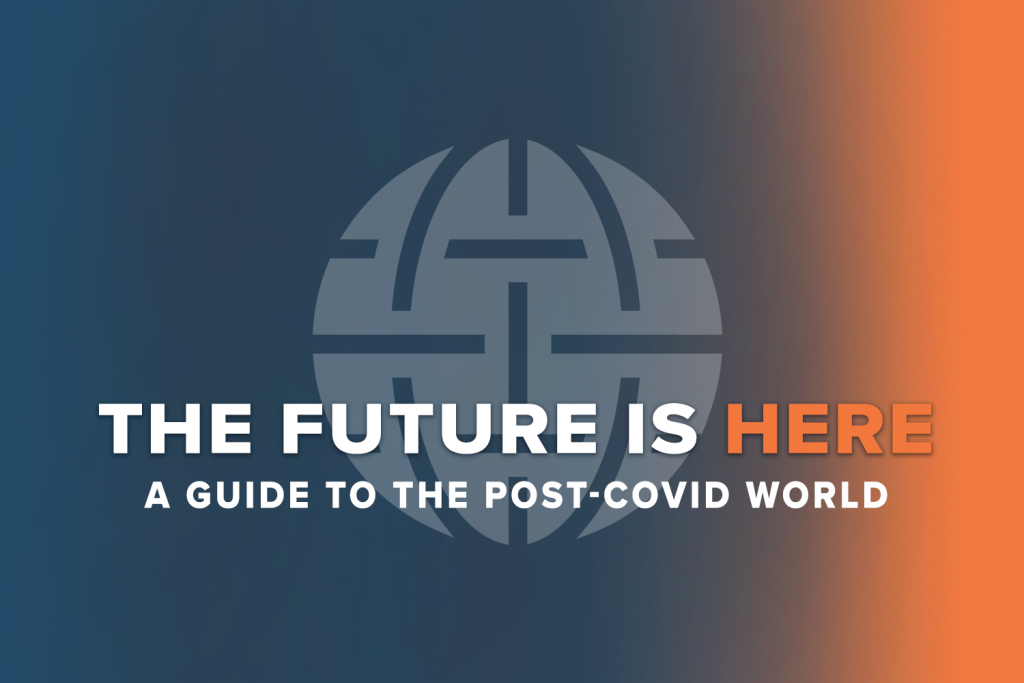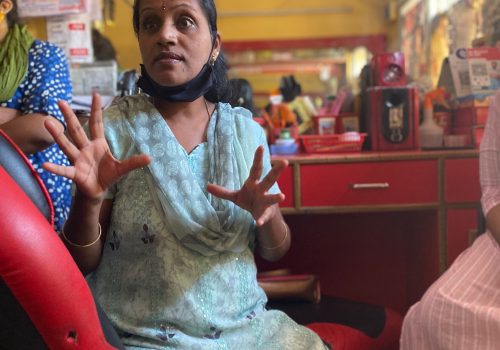The future is here: A guide to the post-COVID world 07/24/2021
Welcome to your guide to where the world is headed during the pandemic era and beyond, from Andrew Marshall. Each week, we’ll bring you the latest and most significant expert insights and international news about how coronavirus is reshaping international affairs. To stay updated each week, sign up to the newsletter here.
Let’s take a spin around the globe, in seven minutes or less.
In top stories this week:
- A “pingdemic”: The latest affliction to hit the United Kingdom
- As delta becomes king, a new challenger emerges: lambda
- While Canada erected welcome signs, the United States painted right over them
- But first…
The big story
How good is your imagination? Can you really imagine what it means to live on a planet of nearly eight billion people, speaking perhaps seven thousand languages, living in nearly two hundred countries?
I thought about this while watching the 2020 Tokyo Olympics opening ceremony this week with my young daughter, as each country’s team trotted across the screen for its masked moment of joy. The television commenters did their best to make it meaningful, at one point describing Uzbekistan as “a little larger than California.” I tried to explain to my daughter where San Marino is, or why Andorra exists, or why Russia, like Voldemort, may not be named.
Let’s forget for a moment the enormous problems that this year’s Olympics are having with COVID-19 and focus on the positive. The world struts across your sitting room, and the finest athletes strain to do their best. It’s a nice moment of global solidarity and fellow feeling.
Many of us have hopes for something better for our planet when we leave the pandemic behind. “Historically, pandemics have forced humans to break with the past and imagine their world anew. This one is no different. It is a portal, a gateway between one world and the next,” wrote novelist Arundhati Roy last April. “We can choose to walk through it, dragging the carcasses of our prejudice… and dead ideas… Or we can walk through lightly, with little luggage, ready to imagine another world. And ready to fight for it.”
COVID-19 has indeed produced a sense of solidarity with others. Many communities saw demonstrations of support for health and front-line workers. Many of us supported efforts to get vaccines to other countries. But we have also witnessed vaccine nationalism, insularity, and communities sinking under the weight of infection while no one helped.
“This crisis is different. It’s a biological threat, and it’s global. Everyone has to change together to deal with it. That’s really history,” wrote Kim Stanley Robinson in the New Yorker at the outset of the crisis. A year on, and many of us are more focused on the state of housing prices and where we can go on vacation. Wealthy countries are manifestly failing to address the economic or health needs of poorer countries. Even within the wealthiest nations, rich communities thrive while poorer ones struggle.
This isn’t viable. “Leaders are dealing with the crisis on a largely national basis, but the virus’s society-dissolving effects do not recognize borders,” wrote former US Secretary of State Henry Kissinger last year. “The founding legend of modern government is a walled city protected by powerful rulers, sometimes despotic, other times benevolent, yet always strong enough to protect the people from an external enemy. Enlightenment thinkers reframed this concept, arguing that the purpose of the legitimate state is to provide for the fundamental needs of the people: security, order, economic well-being, and justice. Individuals cannot secure these things on their own. The pandemic has prompted an anachronism, a revival of the walled city in an age when prosperity depends on global trade and movement of people.”
The crisis began, in some ways, with a failure to imagine something bigger than ourselves. Even when the world knew that a pandemic had begun in China, those responsible failed to prepare, wrote Tim Lord, a senior fellow at the Tony Blair Institute for Global Change. “The fundamental issue was a failure of imagination. We couldn’t really imagine what a pandemic would be like. And because we couldn’t imagine it, we failed to adequately prepare for it.”
Lord draws the obvious parallel with climate change. “We struggle to imagine what the impacts of unabated climate change will really feel like when they are happening—because, for sure, while we’ve had some warming so far, it’s on track to get a whole lot worse unless we take urgent and fundamental action.”
The last few weeks have shown us what it will look like. It looks like a commuter in a flooded Chinese train struggling to keep their head above the water or like a Volkswagen floating down a street in Germany after a river bursts its banks.
It is too much to imagine other countries, perhaps. But as far as individuals are concerned, we can empathize with the images of a person struggling to stay alive. And when I think of the lives lost from COVID-19, it is not the statistics that come to mind but my friend in South Africa, a neighbor’s father in Peru, or a much-loved former colleague in the United Kingdom.
As we try to rebuild from the pandemic, that is the way to imagine a larger reality: not masses of statistics, or the abstractions of national suffering, but individuals around the world struggling to survive against the odds.
In the next two weeks, we will cheer for athletes from many other countries as they thrill us with their tenacity, humor, strength, resilience, and humanity. Through that experience, we can for a few weeks imagine others leading very different lives in different places, with whom we might just have something in common. In the end, it is the individuals we cheer for, not their flags.
Subscribe to The future is here: A guide to the post-COVID world
Sign up for a weekly roundup of top expert insights and international news about how coronavirus is reshaping international affairs.

The world in brief
Insights from across the planet, in ten bullets or fewer
- Indonesia is suffering a COVID-19 wave. The world’s fourth most populous country has one of the highest numbers of new cases in the world for the past week, with more than 300,000 new infections and more than eight thousand deaths. “Medical facilities in big cities across the island have for months been under immense pressure, unable to cope with the influx in patients. Many people have died at home, unable to find treatment,” reports the Guardian.
- Africa warned not to relax as the virus eases. New COVID-19 cases in Africa have slowed, as the rate of new infections in South Africa declines. But infections outside South Africa continue to climb, and health authorities have warned that things may yet get worse. “Be under no illusions, Africa’s third wave is absolutely not over,” said Dr. Matshidiso Moeti, World Health Organization Regional Director for Africa. In good news for the continent, a South African firm will begin producing the Pfizer-BioNTech coronavirus vaccine, Pfizer announced Wednesday.
- The United States is facing a new upsurge in cases. “COVID-19 cases nearly tripled in the U.S. over two weeks amid an onslaught of vaccine misinformation that is straining hospitals,” reports the Associated Press. “Health officials blame the delta variant and slowing vaccination rates. Just 56.2% of Americans have gotten at least one dose of the vaccine, according to the Centers for Disease Control and Prevention.” Washington, DC, is facing a scattering of new cases, including a White House staffer and a senior communications aide to House Speaker Nancy Pelosi.
- A new variant is circulating in the United States. It only makes up 1 percent of US cases in recent weeks, but the lambda variant, first spotted in Peru, “has started to be identified in several states,” reports National Public Radio. The dominant delta variant now constitutes 83 percent of US cases.
- The UK’s big reopening has not worked as planned. They call it the “pingdemic,” reports the New York Times. Throughout the United Kingdom, residents are getting pings from a government-sponsored contact-tracing app asking them to quarantine for ten days because they were in close quarters with someone who tested positive. The result is a cascade of shuttered businesses and disrupted services.
- When will it be time to go back to Canada? The Canadian government announced that “as of August 9, fully vaccinated American citizens and permanent residents can enter the country for leisure via land crossings and nine airports,” reports National Geographic. Not so fast, said the United States, which renewed its own land border restrictions with Canada and Mexico through at least August 21—citing the spread of the delta variant, the Washington Post reports.
- US mass transit is recovering very slowly. Last month, ridership across more than one hundred bus, subway, and commuter rail systems rose substantially—but still was barely more than one-third of 2019 levels, reports NBC, analyzing three years of data from the scheduling app Transit. “And transportation experts say the numbers might not rebound until the end of the year,” NBC adds.
- It is OK to have fun again. The Financial Times has considered the issue and ruled that fun can now be had. Responding to epidemiologically unsound criticism of those who go to the beach, the paper’s Jemima Kelly says: “There’s no scientific reason to stop people enjoying themselves outside.”
The inside scoop
Insights from the Atlantic Council
Andrew Marshall is the Vice President of Communications for the Atlantic Council. He leads the Council’s media, digital, and editorial efforts, and coordinates the way the Council talks with its key communities.


